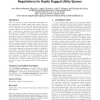Free Online Productivity Tools
i2Speak
i2Symbol
i2OCR
iTex2Img
iWeb2Print
iWeb2Shot
i2Type
iPdf2Split
iPdf2Merge
i2Bopomofo
i2Arabic
i2Style
i2Image
i2PDF
iLatex2Rtf
Sci2ools
109
Voted
ATAL
2010
Springer
2010
Springer
Avoiding the prisoner's dilemma in auction-based negotiations for highly rugged utility spaces
There is a number of recent research lines addressing complex negotiations in highly rugged utility spaces. However, most of them focus on overcoming the problems imposed by the complexity of the scenario, without analyzing the strategic behavior of the agents in the models they propose. Analyzing the dynamics of the negotiation process when agents with different strategies interact is necessary to apply these models to real, competitive environments, where agents cannot be supposed to behave in the same way. Specially problematic are situations like the well-known prisoner's dilemma, or more generally, situations of high price of anarchy. These situations imply that individual rationality drives the agents towards strategies which yield low individual and social welfares. In highly rugged scenarios, such situations usually make agents fail to reach an agreement, and therefore negotiation mechanisms should be designed to avoid them. This paper performs a strategy analysis of an a...
| Added | 06 Dec 2010 |
| Updated | 06 Dec 2010 |
| Type | Conference |
| Year | 2010 |
| Where | ATAL |
| Authors | Ivan Marsá-Maestre, Miguel A. López-Carmona, Juan R. Velasco, Enrique de la Hoz |
Comments (0)

